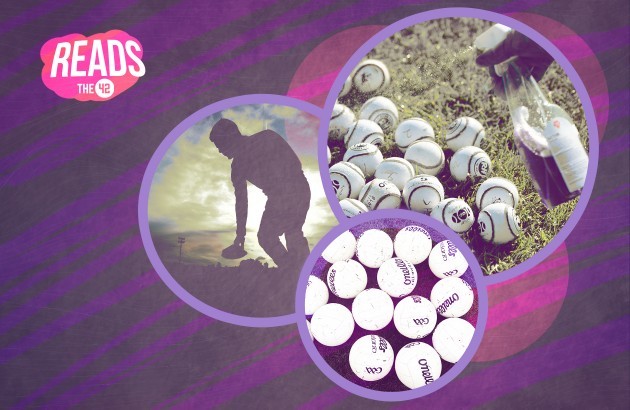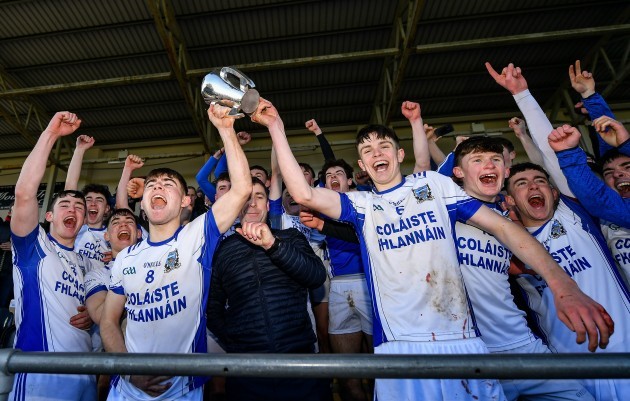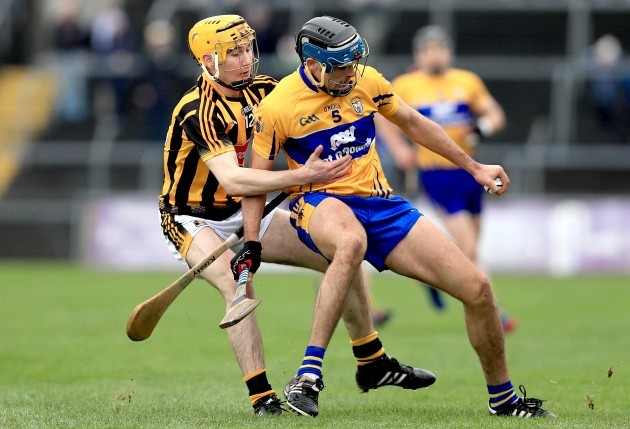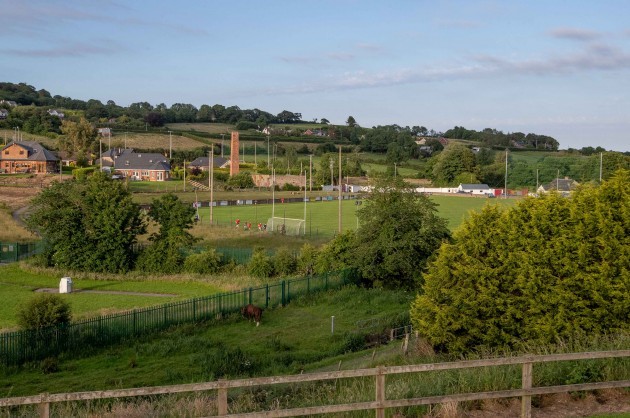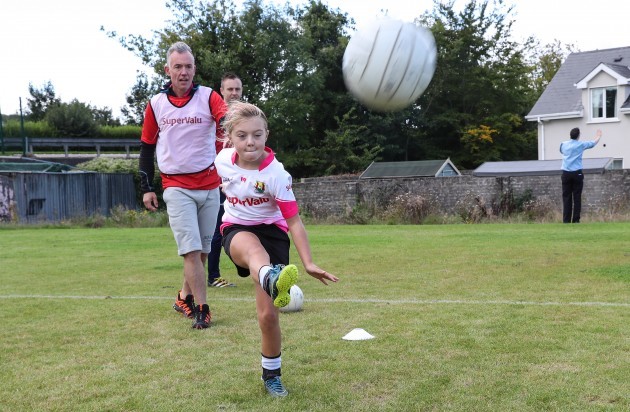BRENDAN BUGLER IS concerned. The Clare All-Ireland winner is a hurling coach, father and teacher. He can see first hand the harmful effects brought about the shutdown of youth sports in this country.
On 1 March 2020, a 3,000 strong crowd packed into Mallow as St Flannan’s College ended a 15-year wait for their 22nd Harty Cup title. Managed by Bugler, the Ennis school beat CBC Cork by three points in the final to collect the prized Munster hurling second-level trophy.
Later that year some players would go on to represent Clare at minor and U20 level, while also lining out in the senior club championship. But those games were either played behind closed doors or in front of 200 people at most.
It may be some time before they play in front of a few thousand spectators again.
The following weekend St Flannan’s defeated St Kieran’s to reach the All-Ireland semi-finals. Four days later came Leo Varadkar’s speech from Washington DC and the underage careers of the St Flannan’s players were irrevocably changed.
The Dr Croke Cup was later cancelled, denying Bugler’s players the chance to play in Croke Park and compete for an All-Ireland medal. This year’s edition of the Harty Cup was scrapped altogether, taking away a chance for St Flannan’s to defend their crown.
Many Leaving Cert students with hopes of breaking onto the school’s senior hurling team in their final year were left to wonder what might have been.
“For 16, 17 and 18 year olds sport is a huge part of their lives if they’re interested in it,” Bugler tells The42.
“In a school like ours and a competition like the Harty Cup, they take it really serious. It’s a great opportunity for them and they love playing it. We were fortunate enough to have success last year and the lift it gives to the students themselves (is huge).
“You’ve players who it’s been their dream to play Harty Cup hurling and all of that. You’ve a lot of guys who’d intentionally do transition year because they have that extra year playing Harty Cup.
“We know the tradition that the competition has. You’ve a lot of players that might never get the chance to play competitively in a Munster competition again, I’m talking about the lads now who wouldn’t go on and represent their county.
“If their club wins a county senior title then they’ll play in a Munster competition. For those lads it’s disappointing that they won’t get the opportunity to play Harty Cup or to play in Munster competition competitively again. It’s a huge void in student’s lives, absolutely.”
- For more great storytelling and analysis from our award-winning journalists, join the club at The42 Membership today. Click here to find out more >
Of course, there are greater things at play. But for a teenager, sport can take up a massive part of their lives.
“School isn’t solely about academics. School is about the social interaction, the friendship people make. If you have students that are into sport schools should be able to facilitate their needs as well.
“For a lot of people that come to us (in Flannan’s), they’ve an absolute huge interest in sport. From my own point of view being a hurling coach I see how much interest they have in it.
“It’s bitterly disappointing for them but in the large scheme of things the competition couldn’t be played because we’re out of school for so long. I feel sorry for them now, the ones that really, really wanted to play it.”
That’s just an example of how youngsters have been affected by the lack of sport.
Outdoor sports for U18s have largely persevered in countries like the Netherlands, Sweden, Italy and France. However, as Ireland endures the longest lockdown in Europe, its children have been denied the opportunity to have fun, exercise, enjoy social interaction and compete on a regular basis.
Not every child is interested in sport, but for those that are, the psychological benefits are enormous. On the other hand, when physical activity is taken away, it has detrimental effects.
“I am noticing a new trait in my children. Silence. I notice it in my young patients too. Gone are the sounds of giggling, bickering, squealing, shouting,” Dr Niamh Lynch consultant paediatrician at Cork’s Bon Secours wrote in the Irish Examiner last February.
“In this toxic lockdown environment, they have become withdrawn, anxious, irritable, and silent.”
Last October, the Aspen Institute in America released a national survey that found almost a 50% drop in children between 6 and 18 playing sport than before the health crisis.
Bugler isn’t so much worried about top level talent, it’s the children who may decide to pack it in altogether that concerns him.
“We’ve been hearing in a lot of sports that kids mightn’t go back playing, and I just hope that isn’t the case,” he says.
“I would have a concern about it. Considering the lockdown last year there was a large chunk of the season they weren’t able to play as well.
“You have a lot of kids when they reach a certain age that they’re at a crossroads whether they’ll continue or not. I’m talking about the 16, 17 sort of age bracket.
“I would worry due to the long break that you might see the likes of those maybe deciding that, ‘You know what, I don’t want to go back.’
“We all know how important sport is for wellbeing and stuff like that so I would have a worry about it, yeah.”
GAA voices have long been calling for underage training to return over the past few months and pointed out the impact they feel a lack of physical activity has had on children.
Former Waterford hurling manager Derek McGrath noted on the Mike Quirke Podcast that his students in De La Salle College were “very demotivated” and “muted” when they returned last September.
Wexford football boss Shane Roche said he has noticed a “quietening” effect in his students when they returned for the current academic year.
In a recent Sunday Independent column, Meath legend and St Patrick’s College, Navan principal Colm O’Rourke reflected that he “must make a note of the next time I hear a student laugh loudly”.
It’s a drum Armagh All-Ireland winner Aidan O’Rourke has long been beating.
“Ask any parent and they’ll tell you the cost of their kids not playing sport right now,” he told the Irish Times in February. “Disappearing personalities, children withdrawing entirely within themselves, right up to severe mental health, self-harm.
“I’m not saying that sport would be a silver bullet to stop all that. But it could have been alleviated at least to some extent by giving them the structure of sport.”
A recent ERSI report found that Ireland’s 12- to 22-year-olds are reporting symptoms of a “low mood”, eating less healthily and getting less exercise since the pandemic started.
Screen time is rising and it will likely have a negative impact on Ireland’s childhood obesity figures, which are already reaching epidemic proportions in recent years.
With just one in 1,000 confirmed cases linked with outdoor transmission, the frustration among coaches and parents about the slow return of youth sport is understandable.
“From a social perspective, you look at all the research about why children play sports and it’s all based on fun and enjoyment,” says former Dublin hurler Niall Corcoran, who works as Games Development Officer in Kilmacud Crokes.
“That’s their motivation to play with their friends. That’s what they’re missing at the moment. They can’t hang out or play sport with their friends, they can’t interact.
“That’s the big development they’re missing and that’s the hardest bit. We’re all trying to do our best with this and what the GAA have proven certainly last summer when we did go back to non-contact stuff how effectively clubs were able to do that.
“Even if it’s non-contact, from a social side of things that they’re able to meet with their friends and the coach again. Even talking to some parents, even they’ll be able to get back on the side of a pitch and interact. There’s huge benefits around that.
“I think there is definitely a concern from a psycho-social perspective in terms of what kids are missing out on.
“Skills-wise they’ll make it up, not overly concerned with that, children are resilient, they’ll develop and we can make up that ground. But it’s definitely from a psycho-social perspective the concerns would be around.”
The fact that children have returned to the classrooms yet are forbidden from engaging in even non-contact training outdoors makes little sense.
However, this week GAA pitches in the North echoed with the sound of children at play and clubs in the 26 counties will follow suit on Monday week.
Many felt it should have happened a long time ago.
“I think it’s a shame across the country to see on Saturday and Sunday mornings club pitches vacated,” say Bugler. “You have to look at the facts and figures.
“I think it’s definitely time that kids are back on the field. And if you look up the north they’re back now since last weekend so dragging it out another week or two….At least we’ve a date anyway where we know it’s going to happen.
“It’s hugely important for kids. I just hope, we’ve been hearing in a lot of sports that kids mightn’t go back playing, and I just hope that isn’t the case.
“You’d be chatting them inside in the classroom and they are really excited,” he remarks about his students.
“There’s massive excitement they’re going to get the opportunity to go back and to be training with their clubs from 29 April.”
Des Ryan is one of the leading sports scientists on the GAA’s ‘Be Ready To Play’ programme which will prepare players (underage and adult) and coaches for the return of GAA action.
At the end of the Premier League season, he’ll depart Arsenal after eight years as head of sports medicine and athletic development in the London club’s academy.
Ryan, who will take up a full-time consultancy role with Setanta Sports College, says an “extra effort” will be needed to get children active again.
“I did have concern for children…being away from their friends, spending lots of time with the same people in the same house, restricted in what they could do.
“Children are supposed to play, to play together that’s how they learn and develop. It’s not ideal. Now there was good reasons behind the lockdowns and thankfully things are starting to improve.
“But we’re going to have to put extra effort into getting them active again. We’re going to have to put extra effort getting them developing again and not just the physical, everything.
“So it is a concern the lack of activity in the lockdown, the lack of connection.”
When the players returned to training in the Arsenal academy, he says “they were like little animals running around crazy, mad keen to be back and to high five each other.”
“The biggest element was keeping them distanced and calm,” he smiles.
Underage GAA coaches all over the country will have to deal with the same excitement all over the country from 26 April.
It’s time to let the kids play.
For more great storytelling and analysis from our award-winning journalists, join the club at The42 Membership today. Click here to find out more >
